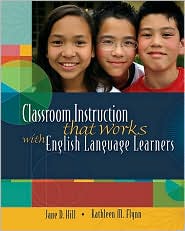Wow, it's been a LONG time since I last posted. October has most definitely set in, with the demands placed on us in California by the impending CELDT testing deadline looming and generally doing more at my job with less people well, you can see it didn't take much for my attention to be diverted to other places.
But I'm back for now...
A synopsis
Last time we chatted I was finishing up a long running series on dissecting an ELD Lesson Plan. To review, these are the components I presented, discussed and gave examples of:
1. Choosing the grammatical function
2. Choosing appropriate topical vocabulary
3. Identifying appropriate grammatical forms
4. Choosing appropriate language prompts that will elicit the grammatical function you want students to practice via a language response.
4. Learning to adjust for ELL's proficiency levels in English
5. Learning structured language routines that ensure ELLs practice new grammatical forms and functions at least 50% of the ELD block
All in all, this covers the basic blocks to be aware of when planning an effective ELD lesson. I do hope that at least some of the components have been useful, enlightening and (fingers crossed) eventually implementable in your classroom.
From Instruction to Policy
In the next few days, I would like to shift a little from instruction for ELLs to more of the policy around ELLs. California has an abundance of policy that cover not just instruction, but parent committees, testing, district compliance, etc. I hope that learning about this will be as useful to you as instruction is. Certainly, when I was in the classroom, I would do things I was asked to do without knowing the rationale or context for it- such as giving the CELDT or wondering why our school didn't have an ELAC.
It is my personal belief that learning how schools work and the expectations that the state has via policy towards schools and districts will help all teachers better understand their role and function in K - 12 education from a perspective that goes beyond their classroom.
I certainly hope you will agree with this sentiment.
We'll start this week!
About Me
- Weezy
- I am an extrovert by nature and an introspect when necessary. I enjoy life and do not take it for granted. My passion is to help educators become more effective at what they do, not only through changing practices, but changing assumptions about the students they teach- particularly, students of color, Standard English Leaners, English Language learners and all others who have been systematically denied access to core curriculum and subjugated to low expectations.
Subscribe to:
Post Comments (Atom)





No comments:
Post a Comment